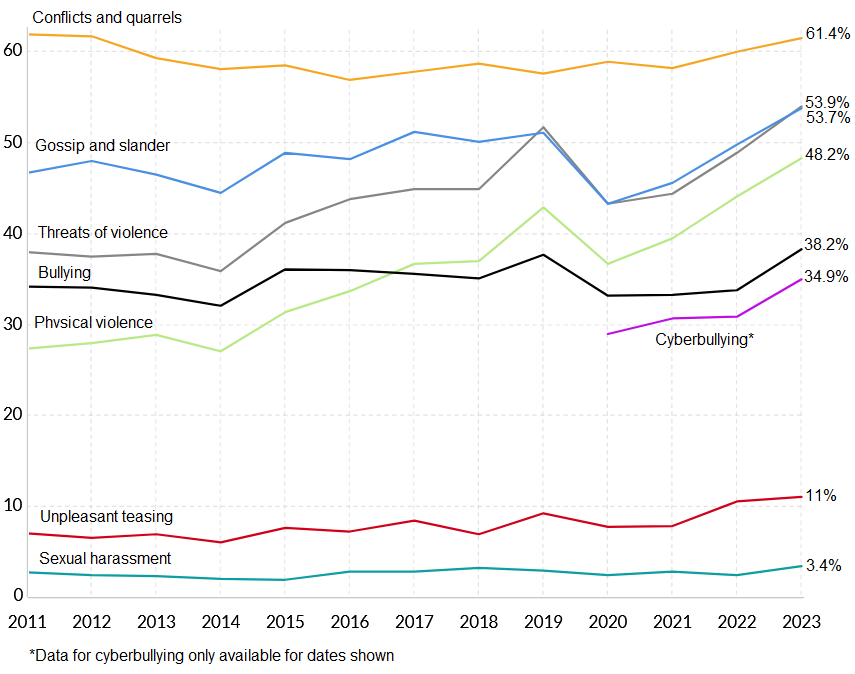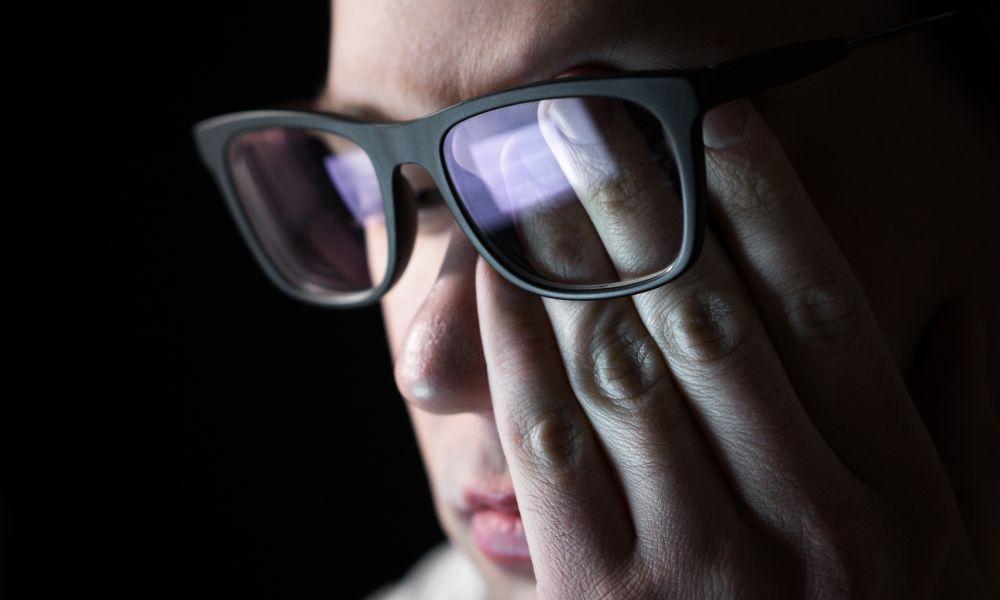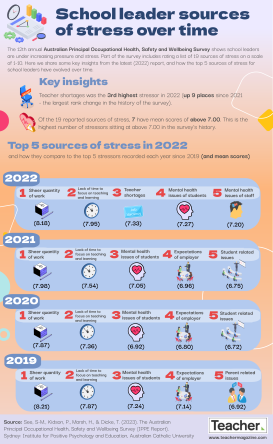Offensive behaviour against school leaders in Australia is at record levels, and of those who have been subject to physical violence at work in the last 12 months students were the perpetrators in 96% of cases.
The Australian Principal Occupational Health, Safety and Wellbeing Survey has been carried out annually since 2011. One of the measures is frequency of 8 offensive behaviours. For 7 of the behaviours the 2023 percentage is the highest since the survey’s inception; the eighth (conflicts and quarrels) is only 0.4% below the highest level ever recorded.

[Frequency of 8 offensive behaviours over time: adapted from Dicke, et al., 2024]
The annual survey is carried out by ACU’s Institute for Positive Psychology and Education. ‘It is deeply concerning that offensive behaviour towards school leaders (and teachers) persists and appears to be on the rise (for example, physical violence has increased 76.5% since the survey’s inception in 2011), putting these vital educators at occupational risk,’ the 2023 report says.
Latest data show more than half (56%) of the 2,307 school leaders who participated said they often seriously consider quitting their current job. ‘Assuming only half of those who agreed or strongly agreed to quit acted on this response, there would be an exodus of more than 500 school leaders – the data strongly suggests this would be experienced school leaders,’ educational psychologist and co-lead investigator Professor Herb Marsh said.
School leaders also suffered higher rates of anxiety and depression than the general population, with early career school leaders most at risk. When survey participants were asked about the most common sources of stress, heavy workloads and a lack of time to focus on teaching and learning took out the top 2 spots, followed by the mental health of students, mental health of staff, and student-related issues.
‘Every year, Australia’s school leaders take responsibility for nearly 3 million lives: the students and staff members in over 9,600 schools spread across the nation. Many are thriving and make significant contributions to their communities. Despite giving their all as best they can, some are coping while a few, too many, are not,’ the 2023 report warns. It features comments from survey participants, including:
I worry about staffing every day. Every morning when staff call in sick I worry about who I have to upset today by taking them off… I worry about my classes (which are uncovered) tomorrow, next week, next month, next term, next year. This stress is going to make everyone sick. I am very resilient but this is going to break me and everyone. I cannot stress enough how difficult and stressful this is. (Female, Special Government, NSW)
Most nights when I am awake I will count how much longer I have to work before I retire or think about what else I could do instead of this job. I often feel like I hate my job. (Female, Combined Government, VIC)
I find immense satisfaction in my role and really enjoy working with staff at the school, fantastic team. … We need to be able to have flexible timetables or do something to alleviate the workload, I feel as if the system is collapsing yet Region focus on telling us we cannot make statements to our community. It makes us look incompetent when we are not, as families do not understand why we aren't running all the programs we would normally do. (Female, Secondary Government, VIC)
There has been a significant loss of autonomy in the role of Principal. I no longer feel that I am able to ‘steer’ the ship. I feel like somebody else now is calling all the shots and decisions are being taken away from school leaders. (Male, Primary Government, QLD)
‘I am very unwell at the moment (physically) and I have also suffered 6 months of ongoing bullying and harassment within the school and community in which I live because I have had to make difficult decisions about people’s performance, conduct and the operations of the school. Whilst I am more than aware that you can’t please all of the people, all of the time, I have been ground down by the almost constant negativity, nastiness and violence within our community… (Female, Secondary Government, NSW)
Co-lead investigator and school wellbeing expert Associate Professor Theresa Dicke called for a national summit to coordinate strategies and resources to ensure issues facing principals are in focus. ‘Otherwise, many of them will act on their intention to leave and it will make achieving important policy initiatives very unlikely.’
There were some positive findings. ‘It is promising that both internal and external colleagues continue to offer strong and growing support to our educators, contributing to more positive and respectful work environments,’ the report notes. School leaders also showed strong levels of resilience, and their work commitment remained high.
References
Dicke, T., Kidson, P., & Marsh, H. (2024). The Australian Principal Occupational Health, Safety and Wellbeing Survey (IPPE Report). Institute for Positive Psychology and Education, Australian Catholic University. https://www.healthandwellbeing.org/pages/principal-reports



